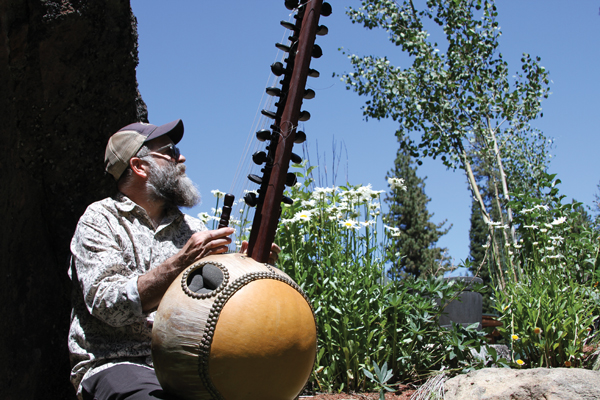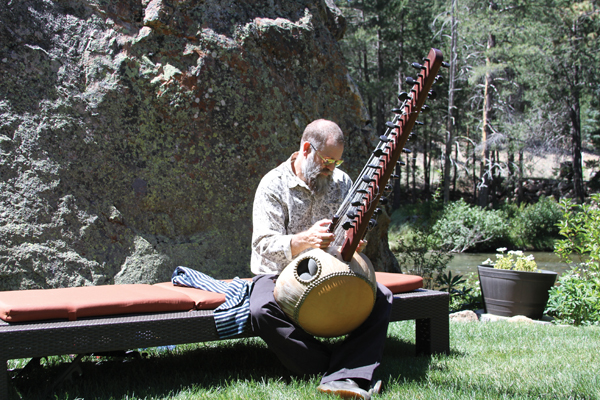Finding Inspiration on the Road and Around the World
Drawn to music since childhood, Burtt starting making his first recordings in the 1960s on reel-to-reel tape, sending the recordings to relatives serving in Vietnam. “If you can talk you can sing, if you can walk you can dance,” says Burtt. This is one of the many bits of sage advice Burtt sprinkles into our conversation. Simple and to the point, but deep when it soaks in. Burtt is all about simplifying to find the right vibration. Best advice given to him on writing music? “My friend, English guitarist Martin Simpson once told me…just let the music come,” he says.
Burtt is full of interesting tidbits and stories from his past that all seem to have an underlying common theme: see what life hands you and figure out why it’s handing it to you.
“Like rungs on a ladder, meeting people you need to meet, it all helps inspire and take you where you’re supposed to be,” says Burtt. The important thing is being open, figuring out how a situation applies to personal intentions and then going from there. “Looking to soak in ways to write, to create… for inspiration…that’s key for any musician,” says Burtt.
That being said, Burtt stresses the importance of finding a balance when soaking in inspiration, of “maintaining original thoughts.” When it comes to remembering songs, Burtt has a memory of an elephant – those songs will imprint after one time. This is a surprising fact considering he caught malaria, known to affect the body neurologically, when living in Africa. “Different artists have different ways to find inspiration, everyone has their own method.” says Burtt, “I’m a double Gemini so for me, what works one day, doesn’t work another.”
Burtt studied creative writing at San Francisco State in the ’80s, and as fate would have it, his advisor was poet Stan Rice, husband of famed vampire novelist Anne Rice. This influence helped build the foundation that would lead Burtt to study abroad in search of cultures that link oral traditions to music and spoken word. Burtt has always been attracted to the notion of cultures influencing art, and in his case, words, music, and the roots of ancient things, especially within African culture. After seeing Toumani Diabate, considered the most influential living kora player, play a show in Berkeley, Burtt was inspired to travel to Africa in the ’90s to learn the instrument and the culture surrounding it.
The kora is a type of harp made from a large calabash with 21 or 26 strings that sounds similar to a flamenco or blues guitar. While spending extensive time in Ghana, The Gambia, and Zimbabwe, Burtt spent 12 hours a day studying while driving a taxi and working in a rice shop to make ends meet. He pursued different avenues of instruments and language, including the mbar, a thumb piano from Zimbabwe, as well learning the traditional language of West Africa, Mandinka, in order to fully immerse himself in the culture.
A turning point in his life as a musician and artist came in the shape of a nearly blind 70-year-old man who worked in a car upholstery shop. The man would walk miles in the African heat to visit with Burtt and sing. These visits became “singing” lessons in the sense of observing singing in its purest form, without filters. He didn’t teach Burtt to sing but rather showed him a different way to sing. Simple but natural, he would start by humming and as it gathered momentum, a song would explode out of him and take off. For Burtt, this insight into tapping into the soul changed the way he would sing for the rest of his life. Inspired by living in Africa, Burtt is attracted to the honesty that comes with living in such a place and recalls thriving in the kind of environment that was “heavily influenced in ancient traditions in poetry of song, ceremonies.” He further observes that Africa functions on a totemic level where reactions are honest and there’s no glossing over of things.
Burtt finds it interesting to watch other bands to see what works for them and how they use the space between the audience and stage. “David Byrne is a master at casting a spell over the room,” he says. Every time Burtt goes on stage he sees it as a new opportunity. The dynamic is different every time depending on who’s in the audience, what the mood is like, and what type of ears are out there. On stage he tries to tap into an energy that creates a balancing act or dance with his audience. “It’s a lot like those Japanese marionette shows [Bunraku], with the image of the puppets reacting to certain movements and sounds, very fluid and natural… and that’s most important to me, to be natural, communicate, respect the audience,” he says.
Burtt’s backing band call themselves The King Tide and consists of seasoned musicians who originally played together in the band Mama’s Cookin’ (with the addition of groovy jazz based bass player Miles Kiechler who joined The King Tide later in the process). Having met Burtt through the Tahoe Conservatory of Music a few years back, the band approached him and asked to be his backing band. “It was intimidating for me, because they’re this well-known, established band with their own good thing going and here they were asking to be my backing band,” Burtt ponders. With mixed pedigrees among the group, it’s no wonder the King Tide is an ideal fit for Burtt, who’d previously been a professional touring musician and done the solo thing for much of his life. “Chemistry is the hardest thing to find in a band, but with these guys we’ve definitely got it,” says Burtt. The making of their debut album Bone To Stone was funded collectively by the band through booking more gigs than usual in order to get the music recorded professionally. Produced by Eric Matlock (Jelly Bread) of Tahoe-based Matlock Studios, the record was tracked in two days, everything tracked live, but mixing took nearly a year.
Burtt usually has two songs going at any given time, writing them all on guitar, but never really sitting down and composing a song start to finish. “Every song has a great ghost in it, like a play,” says Burtt. “It’s getting to the space to create and letting it flow that’s the challenging part.”
Burtt has traveled and worked extensively with musicians like Corey Harris, an American blues and reggae musician and a MacArthur Fellows Program award recipient, blues soul musician Eric Lindell, and acoustic blues guitarist John Cephas. He’s made connections through playing on other people’s records, and because of the variety of instruments he plays, studio work has always been steady. But playing live, backed by a band that believes in the synergy is where he feels most at home. “When I’m on stage, it’s like surfing on a really good day when conditions come together,” Burtt says, “there’s nothing like it. Best two hours of my life, I’m lucky to experience it.”
Follow online at peterjosephburtt.com
photography by Antonina Lerch


